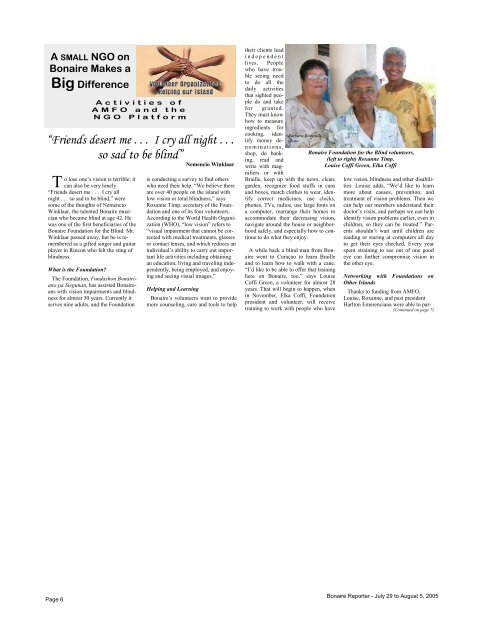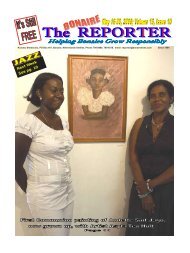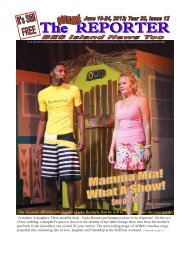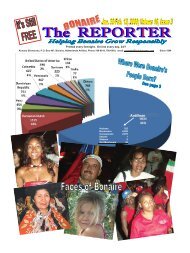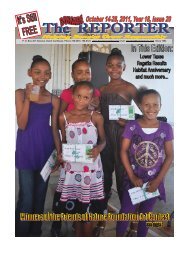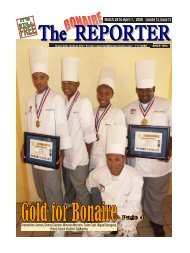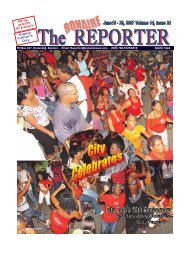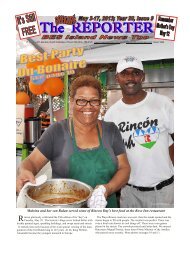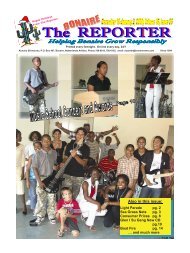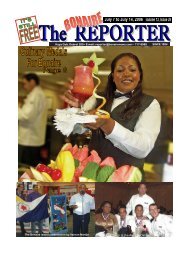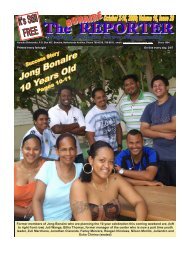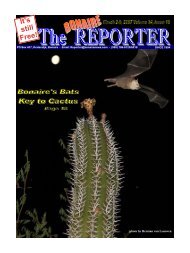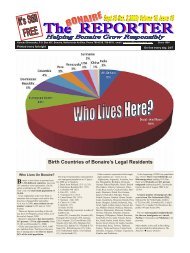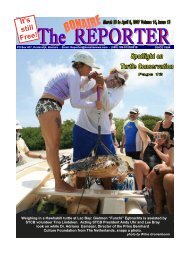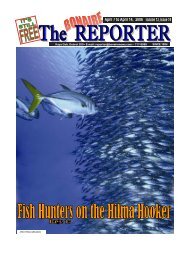July 29 to August 5, 2005 Volume 12, Issue 29 - The Bonaire Reporter
July 29 to August 5, 2005 Volume 12, Issue 29 - The Bonaire Reporter
July 29 to August 5, 2005 Volume 12, Issue 29 - The Bonaire Reporter
Create successful ePaper yourself
Turn your PDF publications into a flip-book with our unique Google optimized e-Paper software.
A SMALL NGO on<br />
<strong>Bonaire</strong> Makes a<br />
Big Difference<br />
T<br />
o lose one’s vision is terrible; it<br />
can also be very lonely.<br />
“Friends desert me . . . I cry all<br />
night . . . so sad <strong>to</strong> be blind,” were<br />
some of the thoughts of Nemencio<br />
Winklaar, the talented <strong>Bonaire</strong> musician<br />
who became blind at age 42. He<br />
was one of the first beneficiaries of the<br />
<strong>Bonaire</strong> Foundation for the Blind. Mr.<br />
Winklaar passed away, but he is remembered<br />
as a gifted singer and guitar<br />
player in Rincon who felt the sting of<br />
blindness.<br />
What is the Foundation?<br />
<strong>The</strong> Foundation, Fundashon Bonairiano<br />
pa Siegunan, has assisted <strong>Bonaire</strong>ans<br />
with vision impairments and blindness<br />
for almost 30 years. Currently it<br />
serves nine adults, and the Foundation<br />
Page 6<br />
Activities of<br />
AMFO and the<br />
NGO Platform<br />
“Friends desert me . . . I cry all night . . .<br />
so sad <strong>to</strong> be blind” Nemencio Winklaar<br />
is conducting a survey <strong>to</strong> find others<br />
who need their help. “We believe there<br />
are over 40 people on the island with<br />
low vision or <strong>to</strong>tal blindness,” says<br />
Roxanne Timp, secretary of the Foundation<br />
and one of its four volunteers.<br />
According <strong>to</strong> the World Health Organization<br />
(WHO), “low vision” refers <strong>to</strong><br />
“visual impairment that cannot be corrected<br />
with medical treatments, glasses<br />
or contact lenses, and which reduces an<br />
individual’s ability <strong>to</strong> carry out important<br />
life activities including obtaining<br />
an education, living and traveling independently,<br />
being employed, and enjoying<br />
and seeing visual images.”<br />
Helping and Learning<br />
<strong>Bonaire</strong>’s volunteers want <strong>to</strong> provide<br />
more counseling, care and <strong>to</strong>ols <strong>to</strong> help<br />
their clients lead<br />
independent<br />
lives. People<br />
who have trouble<br />
seeing need<br />
<strong>to</strong> do all the<br />
daily activities<br />
that sighted people<br />
do and take<br />
for granted.<br />
<strong>The</strong>y must know<br />
how <strong>to</strong> measure<br />
ingredients for<br />
cooking, identify<br />
money denominations,<br />
shop, do banking,<br />
read and<br />
write with magnifiers<br />
or with<br />
Barbara Bianculli<br />
pho<strong>to</strong><br />
Braille, keep up with the news, clean,<br />
garden, recognize food stuffs in cans<br />
and boxes, match clothes <strong>to</strong> wear, identify<br />
correct medicines, use clocks,<br />
phones, TVs, radios, use large fonts on<br />
a computer, rearrange their homes <strong>to</strong><br />
accommodate their decreasing vision,<br />
navigate around the house or neighborhood<br />
safely, and especially how <strong>to</strong> continue<br />
<strong>to</strong> do what they enjoy.<br />
A while back a blind man from <strong>Bonaire</strong><br />
went <strong>to</strong> Curaçao <strong>to</strong> learn Braille<br />
and <strong>to</strong> learn how <strong>to</strong> walk with a cane.<br />
“I’d like <strong>to</strong> be able <strong>to</strong> offer that training<br />
here on <strong>Bonaire</strong>, <strong>to</strong>o,” says Louise<br />
Coffi Green, a volunteer for almost 28<br />
years. That will begin <strong>to</strong> happen, when<br />
in November, Elka Coffi, Foundation<br />
president and volunteer, will receive<br />
training <strong>to</strong> work with people who have<br />
<strong>Bonaire</strong> Foundation for the Blind volunteers,<br />
(left <strong>to</strong> right) Roxanne Timp,<br />
Louise Coffi Green, Elka Coffi<br />
low vision, blindness and other disabilities.<br />
Louise adds, “We’d like <strong>to</strong> learn<br />
more about causes, prevention, and<br />
treatment of vision problems. <strong>The</strong>n we<br />
can help our members understand their<br />
doc<strong>to</strong>r’s visits, and perhaps we can help<br />
identify vision problems earlier, even in<br />
children, so they can be treated.” Parents<br />
shouldn’t wait until children are<br />
reading or staring at computers all day<br />
<strong>to</strong> get their eyes checked. Every year<br />
spent straining <strong>to</strong> see out of one good<br />
eye can further compromise vision in<br />
the other eye.<br />
Networking with Foundations on<br />
Other Islands<br />
Thanks <strong>to</strong> funding from AMFO,<br />
Louise, Roxanne, and past president<br />
Harl<strong>to</strong>n Emerenciana were able <strong>to</strong> par-<br />
(Continued on page 7)<br />
<strong>Bonaire</strong> <strong>Reporter</strong> - <strong>July</strong> <strong>29</strong> <strong>to</strong> <strong>August</strong> 5, <strong>2005</strong>


